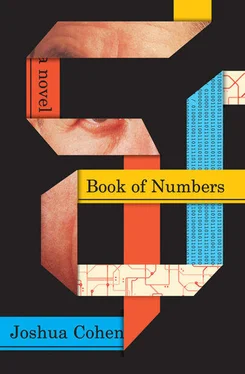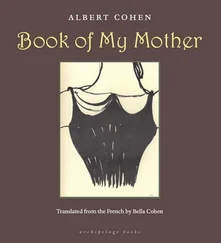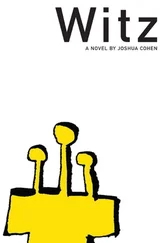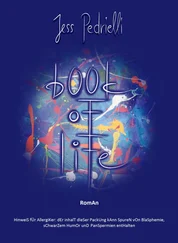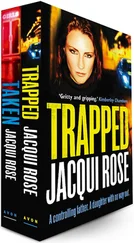In the foodcourt there was a pub called Hybernopub, theme of Dublin. Its façade was fêted with shamrocks, bows rising crassly from cauldrons. Outside the premises an animatronic leprechaun jigged on a plaster keg and listed, in robotic Arabic and this language, robotically but with an Arabic growl, not beers but nearbeers, missed beers, close but no dice beers, pints of simulhops, the demalted and wortless unfoaming, and runed on the keg itself were their bankrupting prices in chalk. Dollars, euros, AED/dhs — that currency whose slick prismatic bills, denominated in every pigment of the oleaginous spectrum, depict skycrapers, sports stadia, falcons? sturgeons? antelopes? rams? — malls, definitely malls.
The chalk.
It was a short thin length like a finger bone, a pointer. I emancipated it from its string, approached her — the other ladies noticed, or didn’t, but parted, humped on.
I quickened, she quickened, tensed from my tension. My shadow crossed hers and was lost.
I was hurrying alongside her — swinging arm and leg caressing her cloth, as if stroking her hair, as if her garment had grown from her scalp — reaching out to her, once more.
It wasn’t a pinch I gave — I’m no pervert — but a mark, a chit, between the shoulders, chalking her for the ease of my stalk.
Just as I did, the ladies — the handful or so remnant, after most had peeled off for meals with their men — exited the foodcourt, and entered the tech sector. They went left, toward the A/V side, featuring televisions (how antique), and stereos (how antiquated) — to the right, the side for computers.
I dropped the chalk stub into a trashcan atop a waxpapered basket of chickpeas.
We passed through a pair of weighted black curtains — like I was passing through the ladies themselves. Suddenly it was night again.
There hadn’t been enough prayers — there would never be. All was frozen dark.
A vacuumsealed interior — it took time to adjust, it took the ladies dispersing. I stood behind woofers, tweeters, subpurrers, gluglugers, supraribbiters, hissers.
My abaya was caught, contained. Glassed plasmatic. She stood in front of a camera, which captured her image, and then sent it to the screen she stood in front of, scrutinizing herself. She moved left, her image moved right. She turned her back, turned her back on herself. It took her — it took all of her sisters doing the same at their own sistered stations — a moment to realize that the cameras were built into the screens.
As they groomed their monitor selves, I monitored them — as they realigned, adjusted. Fascinating how their abayat resembled screens — black screens struck from the walls and curtained around their curvatures.
Still the chalk on my girl’s back shone through, from deep amid the mediaroom mockups. She’d strip before bed to wash that body beneath, the skin the permanent abaya, and find this sign singed into her skin, and take it as intended and find me? though if a symbol was all I could afford, how could I be sure it’d be interpreted correctly?
I considered returning, retrieving the chalk, to outline my body in a very public atrium.
The girls trembled before their trembling, while I wavered undecided between signal and noise, feigning interest in a gadget.
It was a Tetheld 4, a successionary replacement device as new in relation to preceding Tethelds as Allah is to Yahweh: with every capability of spoken life (it had a phone and SUI, or semantic user interface), and of textual life (via Tetsuite), and was equipped for music/pics/vids (multiformat/polyshareable, via mOEs, or mobile operating ecesis), and for any other experience purchasable online (4G). It had a health monitor that took blood pressure, pulse and body temp, body mass index, tested reflexes — I’m sure it even legally notarized.
An Emiri tween — torqued by gym and sleazily pimpsuited — approached sniffing commission, “Any assistance?” And while I was declining his attentions, she vanished — my abaya, disappeared.
I glanced from the flash in my hand, and she was gone, they all were.
Only their images remained for a breath, then faded.
Strike this.
Strike this like an Arab bride.
://
I was back in my room switching channels, too wasted to pack. BBCs 1–4, CNN Int’l, Eurosport (volleyball), Al Jazeera (unrest). I sat through a documentary about the Khaleej but clicked away during a segment on its dining facilities. The weather was a rerun too.
Black and white manna crackled across the entertainment system glass.
It’s like with the Korans I’ve been reading, it’s like with any other paradisiacally dictated book. There’s enough of everything for everyone, there’s never any call to hoard or grub. When you’re wandering the desert, you get to decide what your manna will taste like. Then you eat it, and whatever it tastes like it is. Pick any verse, interpret it into any texture, any flavor, sweet or savory. Corny honey. Matzah brei. Milk schmilk. Bdellium and coriander dew fondue. Any verse can be historicized, analogized — made palatable.
I paged through my Korans to the sura that one edition calls The Banquet and the other calls The Feast, which concerns — dilating on the dilemma of how to sojourn among strangers while preserving a sense of unblemishedness — Islam’s dietary laws. Abu Dhabi’s free copies were preferential to Dubai’s, more archaic, more Thous and Arts — neither copy credited its translators.
Following the prohibitions against consuming prey, raw blood of any type, any porcine product, and the meat of any oblation dedicated to any god not Allah, The Banquet/Feast serves up a delight — by decreeing that Israel had been deeded to the Israelites, the Jews: “the Followers of Scripture” (Dubai version), “the People of the Book” (Dhabi version).
“Enter the advantageous land [Dubai]/the blessed land [Dhabi] that Allah has assigned [Dubai]/hath ordained [Dhabi] for you.” It’s incredible: the text says just what I want it to say, just what the Muslims, I’m sure, don’t need it meaning.
Revisiting the gastronomical proscriptions had whetted my appetite. But I had no patience for the restaurants. The linen flap. The fork and spoon routine. Oppressive. By the second course even the disdain, the derisive scorn, has spoiled to stale formality.
I was having inexplicable tastes, slavering for a porkwing, like a wing from a pig that flies, the blood of beef roadkill consecrated to Baal, the paschal ewe for two, a chicken flipper — the special?
What on the side? Survival’s just a matter of taking every side.
Pastures of greens, eggplant swords beaten into ploughshares. Starches.
I hung up the phone, went for another dram of brown, then stood on the bed and disabled the nimbus of smoke detector, lit a cig — where’s my drink? atop the minbar or bottledwater minibar? There it is. Water down the brown. The same sura bans this booze.
Towel under the draft to block the smoke.
\
The chime at the door had me cowering. What happens if you choose your manna falsely? does the divine chef intuit the heart’s hunger and modify the menu?
I bundled all my Hustler UK s and Club Derriere s into a drawer, doubletapped the doorcom monitor, nudged away the towel, unlocked, unbolted, unchained. On the other side was the boy. The bringer and bearer. He was polite and neat in a stealth tuxedo, his moustache pubescent fascist. Ratib, in English at least, his nametag printed in two alphabets, Ratib. He fluttered a napkin, set a chafing dish atop the table, formerly the desk.
He was older than I’d remembered, or younger — point is, how can I be expected to distinguish between the Ratibs? given that they, the Ratibs, aren’t incentivized enough to distinguish themselves? All the Khaleej’s servants, and the Burj’s too: their faces contort in my mind, like wet sand trampled to dry and harden into brick, and I mean that as praise, if management will pass it along.
Читать дальше
